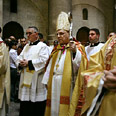
Undiplomatic maneuvers
Vatican envoy's threat to boycott Shoah ceremony raises questions about him, us
Ambassador Monsignor Antonio Franco had decided to boycott the ceremony in his rage over the caption that appears beneath a Yad Vashem photograph of the Pope during the Holocaust. It seems that he was particularly outraged at the words saying that Pope Pius XII's response to the murder of Jews during the Holocaust is controversial…and that with his appointment in 1939 he concealed a memo against racism and anti-Semitism compiled by his predecessor.
“Even when reports about the murder of Jews reached the Vatican, the Pope did not protest," …and didn't write a thing. He did not intervene even when Jews from Rome were deported to Auschwitz.
"His silence and the absence of guidelines obliged churches throughout Europe to decide on their own how to react." The Pope's response as outlined above is also controversial according to the Encyclopedia Britannica. The memo was indeed concealed. There is no evidence of public protest by the Pope against the Holocaust.
His lack of action during the deportation of Jews from Rome to Auschwitz is also a fact (and the hiding of several dozens of Jews in the Vatican does not contradict this.) The independent decisions taken by churches throughout Europe are well known. So what sparked the ambassador's ire?
Alternately, even in the event that the caption at Yad Vashem had been erroneous, one could still assume that the Vatican's ambassador would demonstrate a minimal level of wisdom and social-humane conduct by not putting the memorial ceremony for six million people at the crux of his protest against one text or another.
'Open Vatican archives'
In his defense it may be said that perhaps he thought this is the way things are done here. According to reports that have not been denied, last year he had asked to change the caption at Yad Vashem, and in return was offered a "deal." The museum's response was that it would be prepared to examine the conduct of Pope Pius XII if researchers would be permitted to review confidential materials at the Vatican archives.
Namely, he was told that there was room from negotiations. What was implied, in essence, is that examination of the Pope's conduct during the Holocaust is not subjected to the need to show museum visitors an accurate picture, but rather, would only be considered if appropriate remuneration is made. That is, the idea that in return for certain confidential documents that would be made available to our experts, perhaps we can concede – or is it forgive? – the Holy See's lack of intervention in the acts of deportations conducted under its very nose in Rome. If the Vatican's archives are made fully available to us, perhaps we can turn Pope Pius XII into a Righteous Gentile.
The deal wasn't executed for some reason. The Vatican archives have remained immune. But what was the ambassador supposed to conclude from such an offensive hint?
Perhaps the same thing he concluded from the "indications" for possible willingness to examine the texts that he says he received after threatening to boycott the ceremony. Perhaps the same thing he concluded from the embarrassing and vile commotion surrounding him so that he would nonetheless attend the ceremony and listen from close up to the words of the acting president and prime minister. Perhaps what he concluded from Yad Vashem's praise for his decision to backtrack on his cynical and deviant threat.
Perhaps he even links the entire affair to the Israeli government's history of disgraceful attitude towards Holocaust survivors still living amongst us.










